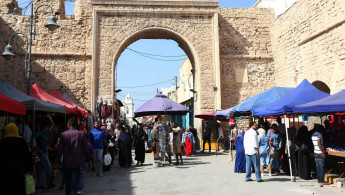Calm comes to Tripoli as Libyan militias call truce
"The armed factions reached an agreement to an immediate ceasefire and withdrawal from positions in Ghabat al-Nasir forest, which will be handed over to the ministry of youth and sports," Nasser al-Krewi, chairman of the municipal council in Tripoli told The New Arab.
"Armed groups agreed and withdrew from their positions Friday night," Krewi said.
The city saw normal life resume as roads previously closed off by militias reopened and "most local shops resumed their business on Saturday", Krewi added.
Tripoli is controlled by a loose alliance of militias of different political and religious factions, and clashes between them are an almost daily occurrence.
Fighting had erupted in the city on Thursday and continued on Friday, with shooting heard throughout the day as most residents stayed indoors.
UN envoy Martin Kobler urged the forces involved in the violence to stop immediately "and for wisdom to prevail".
"It is completely unacceptable for armed groups to fight to assert their interest and control, particularly in residential areas, terrorising the population," Kobler said.
At least eight people were killed on Thursday and Friday, a source at the al-Khadhra hospital in Tripoli said.
Five years after Libya's 2011 revolution that toppled long-time dictator Muammar Gaddafi, the country remains embroiled in violence and political chaos as the militias and two rival governments vie for power.
A UN-backed Government of National Accord took up office in March with the hopes of re-establishing central power and stemming a militant threat from the Islamic State group.
It was intended to replace the rival administrations but has failed to win a vote of confidence from the parliament in Tobruk while the Tripoli-based GNA considers it illegitimate.
The GNA suffered a fresh setback in October after the rival Government of National Salvation seized key offices in the capital.
Agencies contributed to this report.





 Follow the Middle East's top stories in English at The New Arab on Google News
Follow the Middle East's top stories in English at The New Arab on Google News


![22 Arab countries at COP29 have rejected the targeting of fossil fuels [Getty]](/sites/default/files/styles/image_330x185/public/2024-11/GettyImages-2184289638.jpg?h=199d8c1f&itok=ptHl5bec)